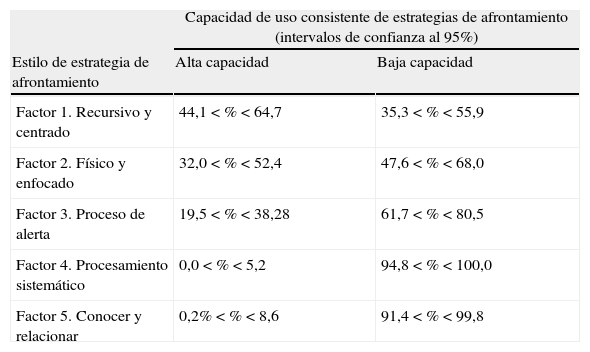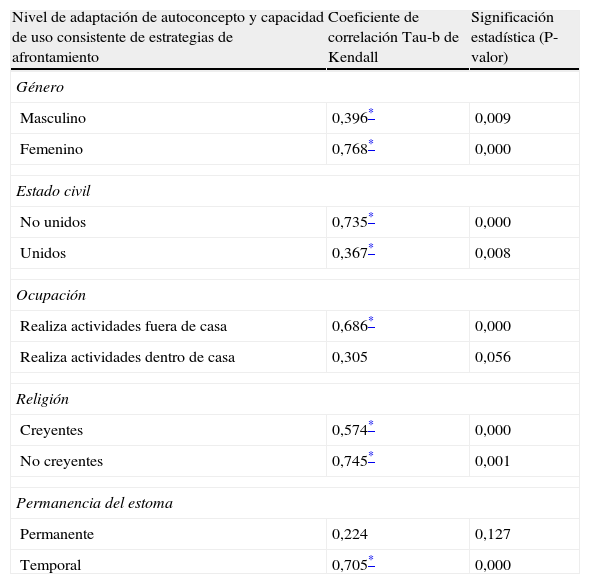Los pacientes ostomizados enfrentan una serie de problemas que impactan negativamente en su bienestar personal. El objetivo de este trabajo es determinar la naturaleza e intensidad de la relación entre el nivel de adaptación del modo autoconcepto y la capacidad de uso consistente de estrategias de afrontamiento de los adultos mayores ostomizados.
MetodologíaCuantitativo, correlacional y transversal. Se aplicaron los instrumentos VIVEROS 03 y CAPS en 3 hospitales de la Ciudad de Durango, México. El estudio incluyó a 90 adultos mayores con un estoma de eliminación intestinal con complicaciones. Se utilizó el estadístico no paramétrico Tau-b de Kendall para medir esta asociación.
ResultadosLa mayoría de los adultos estudiados (61,3 < % < 79,9) no se encuentran completamente adaptados a la condición de vivir con un estoma intestinal. Asimismo, existe una correlación positiva moderada (0,569) entre el nivel de adaptación en el modo de autoconcepto de los adultos mayores con estoma y el uso consistente de estrategias de afrontamiento.
ConclusionesLa presencia de un estoma intestinal representa un problema de salud físico y emocional que se refleja en el nivel de adaptación de la autoimagen. Los adultos mayores ostomizados emplean solo una pequeña parte de sus mecanismos de defensa como parte del proceso de afrontamiento. Lo anterior limita su capacidad para encarar las adversidades relacionadas con su condición, generando potencialmente mayores complicaciones a su salud.
Ostomy patients face a number of problems that impact negatively on their personal welfare. The aim of this research is determine the nature and intensity of the relationship between the level of self-concept adaptive mode and the consistent use of coping strategies of older adults with a stoma.
MethodologyQuantitative, correlational and transversal. VIVEROS 03 and CAPS surveys were applied in 3 hospitals in the City of Durango, México. The study included 90 older adults with an intestinal elimination stoma with complications. Kendall's Tau-b coefficient was the non-parametric test used to measure this association.
ResultsMost older adults analyzed (61.3 < % < 79.9) are not completely adapted to the condition of living with an intestinal stoma. There is also a moderate positive correlation (0,569) between the level of adaptation of the older adults with a stoma and the conscious use of coping strategies.
ConclusionsThe presence of an intestinal stoma represents a physical and psychological health problem that is reflected in the level of adaptation of the self-image. Elderly people with a stoma use only a small part of defense mechanisms as part of coping process. This limits their ability to face the adversities related to their condition, potentially causing major health complications.
Artículo
Comprando el artículo el PDF del mismo podrá ser descargado
Precio 19,34 €
Comprar ahora








